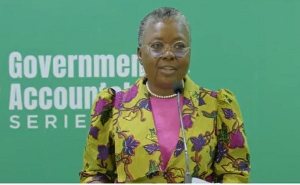The Ministry of Fisheries has launched a new curriculum for the Anomabo Fisheries College, a key initiative aimed at strengthening Ghana’s fishing industry.
According to a report by GhanaWeb TV on August 29, 2025, the project, originally started by the late Professor John Evans Atta Mills in 2012, seeks to improve the skills and competencies of future professionals in the fisheries sector.
Emelia Arthur, Minister for Fisheries and Aquaculture, underscored the importance of aligning educational outcomes with industry needs to ensure trainees are adequately prepared.
The project, which has faced financial and capacity challenges in the past, is expected to be fully operational by early 2026 following renewed presidential commitment.
“It is important to learn from successful international models while tailoring those insights to Ghana’s unique context. Given the constantly evolving demands of the fisheries and aquaculture sector, we welcome proposals for partnerships, internships, and community engagement that can strengthen the link between theory and practice. This will provide students with a well-rounded education and equip them to develop concrete strategies for addressing the sector’s challenges,” she stated.
The new curriculum focuses on fisheries management, aquaculture, and marine conservation, with Phase I covering the construction of essential facilities.
The Ministerial Committee has been tasked with ensuring that the curriculum meets industry demands, incorporates best practices, and reviews existing training models.
“The mandate of this Ministerial Committee is both vital and forward-looking. It is tasked with laying the foundation for a transformative educational initiative that will enhance performance across the fisheries and aquaculture sector,” the Minister added.
Despite earlier delays, work is progressing steadily, with infrastructure expected to be ready for the first student intake in early 2026.
The initiative is designed to provide a comprehensive education that addresses the evolving challenges of the fisheries sector.
“The Committee is responsible for developing a curriculum that is industry-driven and internationally benchmarked. As we embark on this important undertaking, I urge broader collaboration with stakeholders from research, academia, industry, government, and civil society to ensure the curriculum is comprehensive, relevant, and inclusive,” she emphasised.
Members of the Ministerial Committee:
• Emelia Arthur (Chairperson)
• Professor Elvis Nyarko, Former Vice-Chancellor, Regional Maritime University (Member)
• Eric Baah, Director of Policy, Planning, Budgeting, Monitoring and Evaluation (Secretary)
Other academic and industry representatives
The establishment of the Anomabo Fisheries College represents a significant milestone in securing the future of Ghana’s fisheries sector.
Watch the video below:



